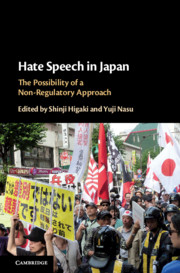Book contents
- Hate Speech in Japan
- Hate Speech in Japan
- Copyright page
- Contents
- Tables
- Figures
- Contributors
- Acknowledgements
- Abbreviations
- Introduction
- Part I Outline
- Part II History
- Part III Legal Framework
- 7 Hate Speech and Criminal Law Frameworks in Japan
- 8 Tort Liability for Hate Speech in Japan
- 9 The Frameworks of the Hate Speech Local Ordinances
- 10 The Legislative Process Leading to the Hate Speech Elimination Act
- 11 The Hate Speech Elimination Act
- Part IV Cases
- Part V Multidisciplinary Debates
- Part VI Current Issues
- Book part
- Index
11 - The Hate Speech Elimination Act
A Legal Analysis
from Part III - Legal Framework
Published online by Cambridge University Press: 15 January 2021
- Hate Speech in Japan
- Hate Speech in Japan
- Copyright page
- Contents
- Tables
- Figures
- Contributors
- Acknowledgements
- Abbreviations
- Introduction
- Part I Outline
- Part II History
- Part III Legal Framework
- 7 Hate Speech and Criminal Law Frameworks in Japan
- 8 Tort Liability for Hate Speech in Japan
- 9 The Frameworks of the Hate Speech Local Ordinances
- 10 The Legislative Process Leading to the Hate Speech Elimination Act
- 11 The Hate Speech Elimination Act
- Part IV Cases
- Part V Multidisciplinary Debates
- Part VI Current Issues
- Book part
- Index
Summary
This chapter offers an outline of the Hate Speech Elimination Act and analyses some of its issues. When the Japanese Diet enacted the Hate Speech Elimination Act in 2016, it was the first law to directly tackle hate speech. The law is unusual because while it clearly declares hate speech to be impermissible, it imposes no penalties upon it. On the one hand, one might argue that the Act properly balances equality and freedom of speech; on the other hand, one might question its effect in combating hate speech. It should be emphasized that the Act requests the national and local governments to implement educational activities to eliminate unfair discriminatory speech and behaviour, as well as to raise awareness among the general public about the issue. Such government activities can be interpreted as a type of ‘government speech’, which can be used to discourage and deter hate speech while avoiding constitutional problems. As such, the Japanese Act may present a modest model that strikes an appropriate balance between freedom of speech and anti-racism.
Keywords
- Type
- Chapter
- Information
- Hate Speech in JapanThe Possibility of a Non-Regulatory Approach, pp. 237 - 254Publisher: Cambridge University PressPrint publication year: 2021
- 2
- Cited by

